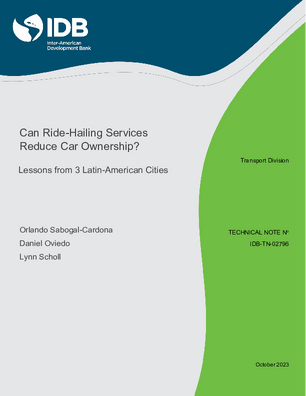Can Ride-Hailing Services Reduce Car Ownership?: Lessons from 3 Latin-American Cities
Date
Oct 2023
App-based ride-hailing is no longer a new transportation phenomenon. Yet much remains unknown about its influence on user behaviors associated with the decarbonization of urban mobility, such as the reduction of car dependency and car ownership. This knowledge gap stands in contrast with efforts in the literature to understand whether ride-hailing substitutes or complements public transit, or the determinants of its adoption. Against this backdrop, this study interrogates the role of app-based ride-hailing on attitudes and perceptions about private car-based mobilities in three large Latin American metropolitan areas. The paper builds on survey data of representative samples of both users and non-users to explore the influence of ride-hailing over the perceived need of owning private vehicles and the likelihood of purchasing or selling a private vehicle. The paper uses logistic regression models to empirically explore how ride-hailing changes the perceived necessity of car ownership, pinpointing different effects between cities and groups of current car users and non-users. Moreover, our results suggest that individuals who use ride-hailing more frequently are also more likely to believe it can reduce their need for personal car ownership. Findings in this paper hold significant potential for policy and regulation in a region marked by uncertainty regarding the optimal approach to regulate app-based services to foster more sustainable urban mobility. It contributes to ongoing debates about the role of app-based mobilities in the transition to low-carbon transportation, particularly in Latin American cities.




